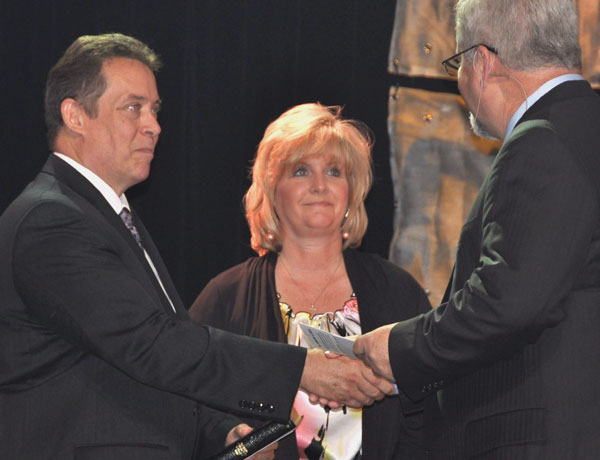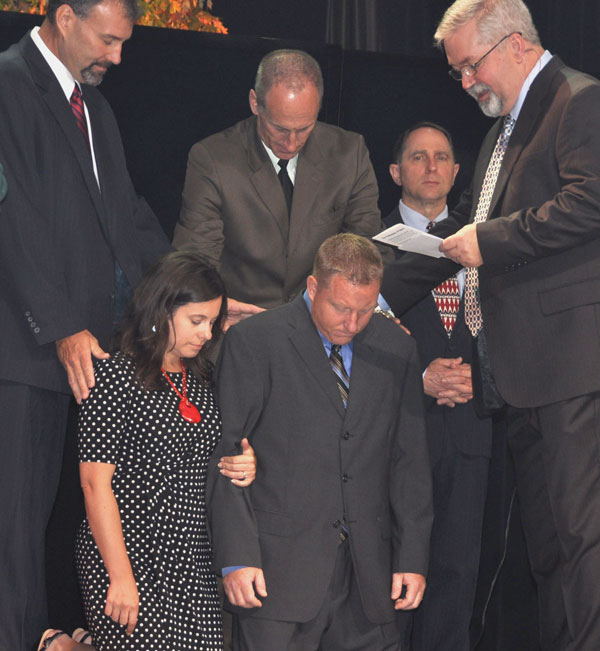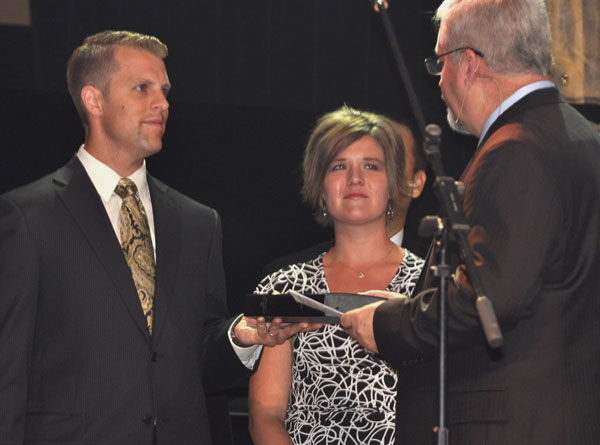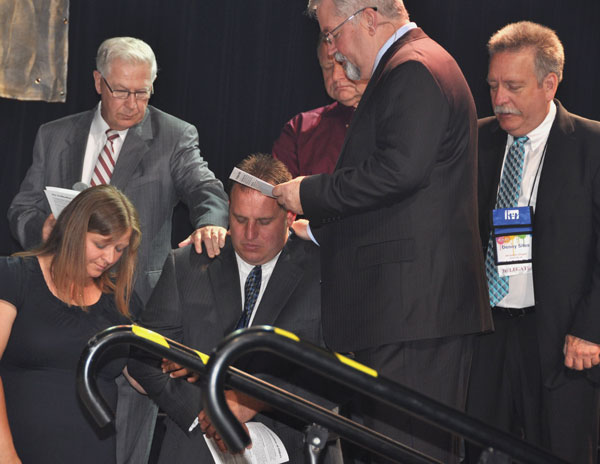29 Aug Recap of the 2023 US National Conference
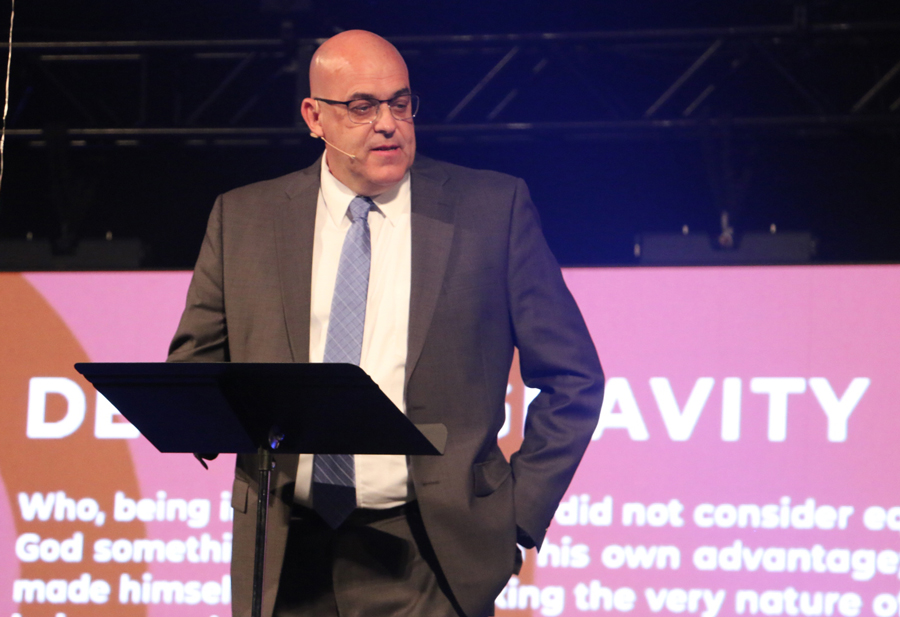
Bishop Todd Fetters speaking on Friday morning to close the conference.
Over 500 people attended the 2023 US National Conference, held July 11-14 at the Grand Wayne Center in downtown Fort Wayne, Ind. They gathered around the theme “Come Together,” with a focus on unity.
Some comments from the evaluations:
The Come Together theme was very fitting. Our UB community is family, and conference is much like a reunion we always look forward to.
Worship was real, evening sessions were good, and the workshops really spoke to me.
I felt the spirit of the living God falling fresh on me.
Every aspect was designed to bring us together. In a time of chaos in the world, I needed the assurance that we are unified in Christ. Thank you for designing a place for us to enjoy each other’s company and lift each other’s burdens together.
Keynote Speakers
There were four main services—Tuesday, Wednesday and Thursday nights, and a concluding service on Friday morning.
Each message was Spirit led. The content prompted conversations with our team and allowed us to evaluate ourselves and the church we serve.
I really enjoyed hearing messages that spoke to our hearts with clear direction from the Lord. And worship was AMAZING!
Dr. Walter Kim, president of the National Association of Evangelicals since 2020, spoke the first two nights. As of 2023, the United Brethren Church has been a member denomination of the NAE for 70 years.
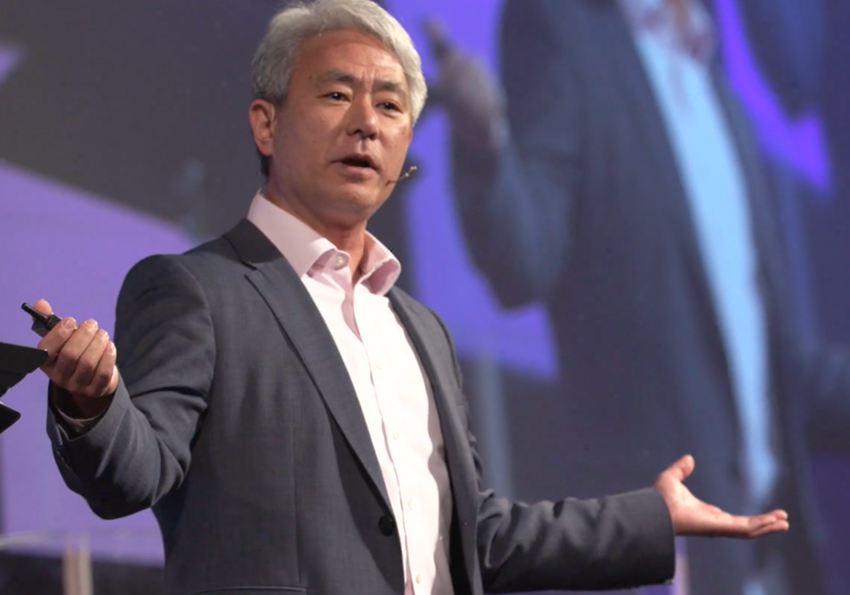
Dr. Walter Kim
Dr. Kim, the son of immigrants, has been a pastor in Massachusetts and Virginia for nearly 20 years, and regularly teaches in seminaries. As NAE president, he frequently addresses evangelical concerns with elected officials and provides theological and cultural commentary to leading news outlets.
Dr Walter Kim provided excellent cultural context for being American and reaching a diverse community.
Walter Kim was sharp and thoughtful. He could speak competently and cogently into today’s cultural issues.
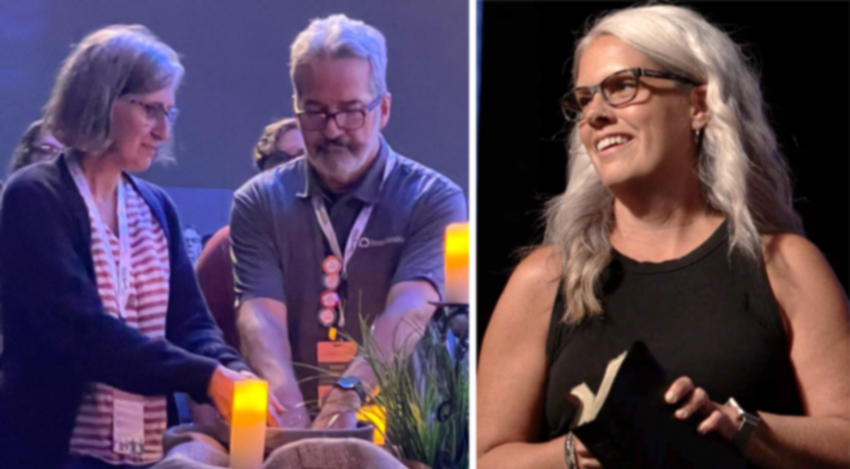
The opening service on Tuesday included a time when people came forward to dip their fingers in water-filled bowls as a way to remember their baptism. Kelly Ball (right), co-pastor of Colwood UB church (Caro, Mich.) led the communion service that night. One person commented, “The water bowls on the first night were such a great experiential reminder of my baptism and the work God has and is doing in my life. Communion on the first night was perfect! Loved starting the week by sitting at Jesus’ table together.”
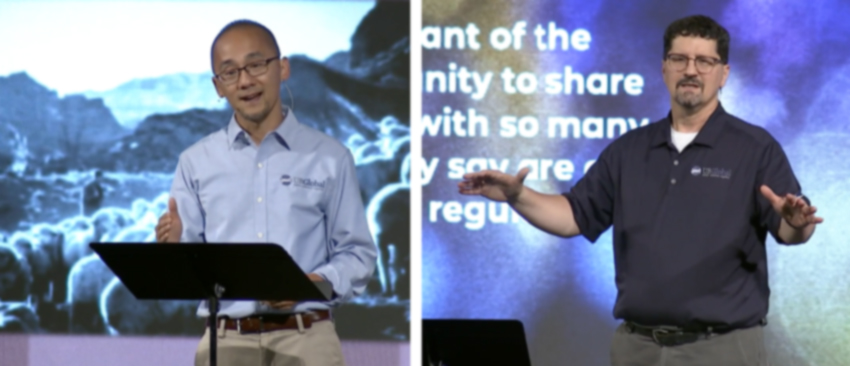
Frank Yang (left) and Steve Fish speaking on Thursday night.
UB missions was the focus of the Thursday night service. UB Global executive director Frank Yang, along with associate director Steve Fish, joined to present the evening message.
I’m grateful for the UB Global guys and how they pointed our churches to unreached people groups.
UB Global’s evening was challenging, passionate, and inspiring.
Steve and Frank shared a compelling message of reaching the lost.
On Friday morning, Bishop Todd Fetters gave a stirring message from Philippians 2:1-18. He focused on three commands—LOVE (each other and the church), LIVE like Jesus, and LIGHT the world.
Said one person, “Bishop, thank you for being bold and reminding us of community and how important it is, and that we need to put aside our personal issues and differences!”
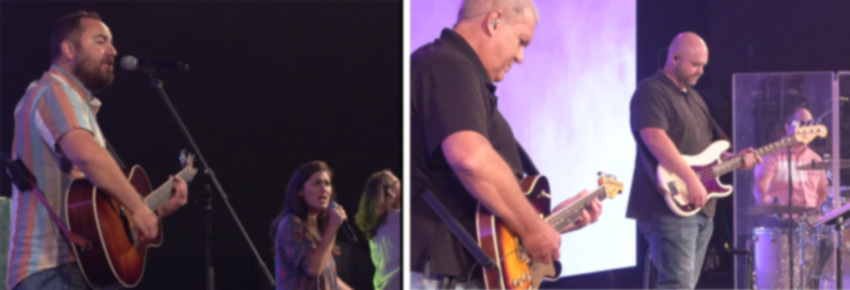
Nathan Hann (left) leading the worship team.

The entire music and production crew.
Music and Production
Nathan Hann and his team from King Street UB church in Chambersburg, Pa., led worship in each service, as well as in the business session. Nathan previously led worship during the 2017 national conference in Lancaster, Pa.
Nate, Alyssa, and the King Street team were excellent! Loved the authenticity they brought. Never once did it feel like a show or a performance. Instead, it felt like we were truly united in worship led by humble leaders.
Sam Delagrange, production manager at Emmanuel UB church in Fort Wayne, and his team at Reliance I/O took care of everything on the production side—the stage setup, lighting, sound, video, projection, and more.
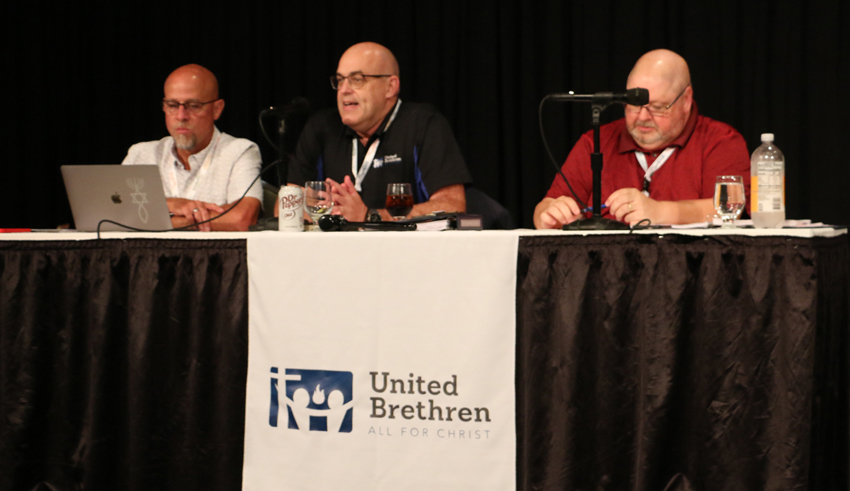
Bishop Todd Fetters (center) chaired the US Conference. He is flanked by recording secretary Roxton Spear (left) and assistant chairperson Jim Bolich.
Wednesday: Business Session
The US National Conference meets every two years, and is the highest governing body for United Brethren churches in the United States. One day is always devoted to business. This year, that day was Wednesday, July 12, 2023.
There were 254 voting members—140 clergy, 114 laypersons. The voting members represented 104 different United Brethren churches in the United States. In addition, there were ten clergy with advisory status. Every church can send at least one lay delegate, with more depending on average attendance. UB ministers who are ordained, or who hold a Specialized Ministry or National Conference license, and are employed by a United Brethren church, also qualify as voting delegates.
The delegates enjoyed breakfast together, and by 8:30 were seated and ready to start. The business session began with a time of worship led by Nathan Hann and his team, and a recitation of the United Brethren Confession of Faith.
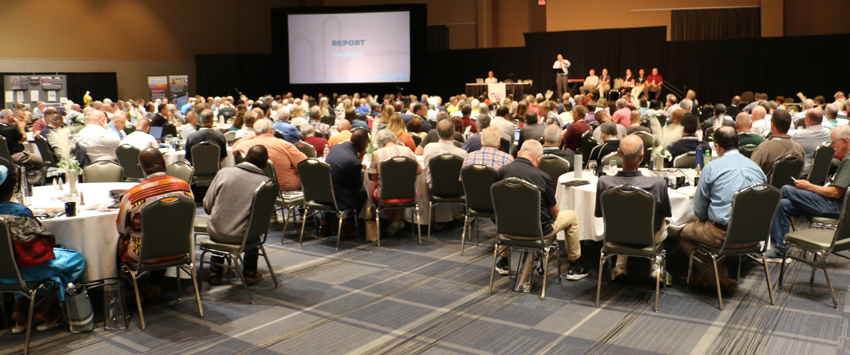
The business session.
Executive Leadership Team
Each national conference elects four members of the Executive Leadership Team, which meets twice a year to handle business between sessions of the national conference. There are 12 members—the bishop, six laypersons, and six clergy. Each National Conference elects two clergy and two laypersons to four-year terms. They join the four members who are in the middle of their four-year terms, and together, they appoint another four persons to two-year terms. It all comes out to three persons from each region (East, Central, North, and West), with an even split between laity and clergy.
The four persons elected are all first-timers to the ELT:
- Central District, clergy: Tim Sherman, senior pastor of Bethel UB church (Elmore, Ohio).
- North District, clergy: Josh Good, senior pastor of Hillsdale UB church (Hillsdale, Mich.).
- East District, laity: Maria Alonso-Tomlinson (International UB church, Allentown, Pa.).
- West District, laity: Michelle Harris (Anchor Community Church, Fort Wayne, Ind.).
Those persons will serve four-year terms. By the end of August they, along with the four continuing members, had appointed four additional persons who will serve two-year terms. The four appointees are all veteran members of the ELT. They are:
- Central District, clergy: Michael Elkins, senior pastor of New Hope Community Church (Bryan, Ohio).
- North District, lay: Joni Michaud, Pleasant Valley UB (Lake Odessa, Mich.).
- East District, lay: Dale Perry, Mount Pleasant UB (Chambersburg, Pa.).
- West District, clergy: Victor Mojica, Clearview UB (Goshen, Ind.).
You can see the entire 2023-2025 ELT here.
Human Reproduction Task Force
The 2017 US National Conference passed six proposals from the Task Force on Human Sexuality, which was established in 2015 by the Executive Leadership Team. Bishop Todd Fetters then began considering the right time to do something similar on the issue of human reproduction. Our statements on Abortion, Family Planning, and Genetic Engineering hadn’t been revised since the 1980s. Bishop Fetters decided, “It was time for us to revisit these statements in light of the enormous scientific advancements that have occurred since the 1980s, and to find our voice for a new generation.”
In March 2022, the ELT appointed six persons to a Task Force on Human Reproduction. Bishop Fetters emphasized, as he had done with the 2017 task force, that there was no desire or appetite to liberalize our positions. In outlining the scope of the HRTF’s work, he directed them to the statements in the Discipline on Abortion, Family Planning, and Genetic Engineering. They took it from there.
The Task Force members brought expertise from a variety of perspectives—legal, family, adoption, therapeutic services, the pastorate, personal experience, Bible/theology, UB missions, and higher education.
- Joni Michaud, chairperson, is a member of Pleasant Valley UB church in Lake Odessa, Mich., a Huntington University graduate, and a practicing lawyer.
- Dr. Kent Eilers is a theology professor at Huntington University.
- Dr. Jody Bowser was senior pastor of King Street UB church in Chambersburg, Pa.; at the end of April 2023, he accepted a pastorate in another denomination.
- Mark Vincenti, an ordained UB minister from Emmanuel UB church in Fort Wayne, Ind., is the campus pastor at Huntington University.
- Kim Fish is a licensed UB minister, licensed social worker, adoptive parent, and individual/family therapist with a private practice in Fort Wayne, Ind. She grew up in the UB church as a preacher’s kid, graduated from Huntington University, and married a UB minister—Steve Fish, now associate director of UB Global.
- Christopher Little V is a UB church planter in Harrisburg, Pa. He and his wife are adoptive parents.
Joni Michaud and Mark Vincenti had also served on the Task Force on Human Sexuality.
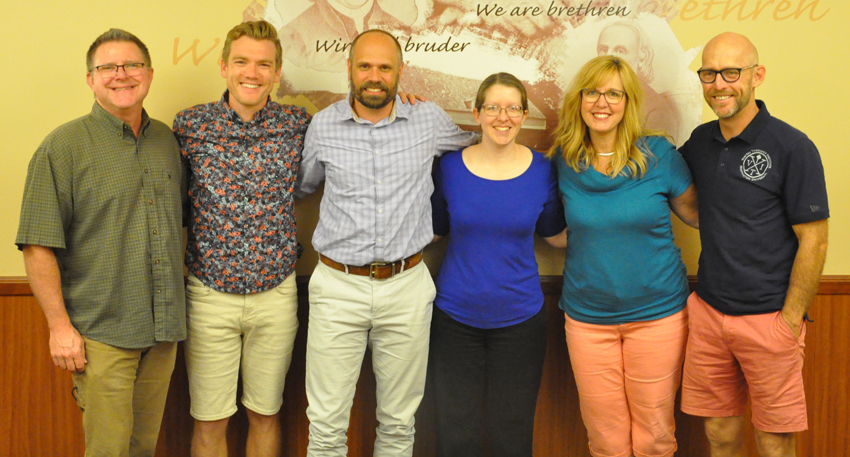
Members of the Human Reproduction Task Force (l-r): Jody Bowser, Christopher Little V, Mark Vincenti, Joni Michaud, Kim Fish, Kent Eilers.
The HRTF submitted their proposals to the Executive Leadership Team in April 2023. The proposals were embedded in a longer “white paper” which helped explain and give context to the proposals. Chairperson Joni Michaud then presented the proposals to the National Conference preview meetings held in Michigan, Indiana, Pennsylvania, and online.
The HRTF report stated, “While issues like abortion remain hotly contested in the wider culture, the general United Brethren position and scriptural basis for it are long-settled and well-established. In looking at the subjects of family planning, abortion and genetic engineering, the primary focus of the task force was to propose revised language for the Discipline that would be both consistent with scripture and would remain relevant as science and technology continue to develop over time. This was particularly significant for the section on genetic engineering, which identifies procedures that are no longer in use and does not account for many developments in the field that have occurred during the last 35 years.”
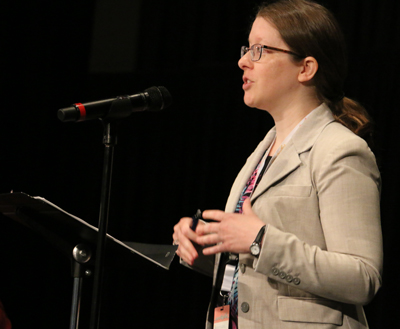
Joni Michaud presenting the task force proposals to the National Conference delegates.
During the business meeting, Joni presented the seven statements which the HRTF was proposing to include in the United Brethren Discipline. All seven were adopted as presented. Six of the statements raised no discussion. The “Abortion” statement took more time, with four proposed amendments and a number of people speaking. However, each amendment in turn was voted down by a clear voice vote. There seemed to be little appetite for changing what the task force had written.
So, we now have new statements on:
- The Beginning of Life
- Family Planning
- Adoption and Foster Care
- Infertility
- Assisted Reproduction
- Abortion
- Human Reproduction and the Responsibility of the Church
Two of the statements, “Abortion” and “Family Planning,” are revisions of existing statements. The other five are entirely new.
You can read the seven HRTF proposals, or the entire HRTF White Paper.
Other Discipline Revision Proposals
In addition, the delegates considered 22 other proposed revisions to the Discipline. Most were minor or editorial—little more than housecleaning, bringing the Discipline into line with actual practice, or correcting inaccuracies.
The delegates moved through them quickly, passing 21 of the revisions without discussion. They deleted proposal 34-4c, which would have revised the liturgy format used for receiving new members into the church. But that was the only change.
You can read those proposals here.
All of these changes, along with the seven statements from the HRTF, have now been incorporated into the UB Discipline.
The 2023-2025 Discipline can be downloaded here.
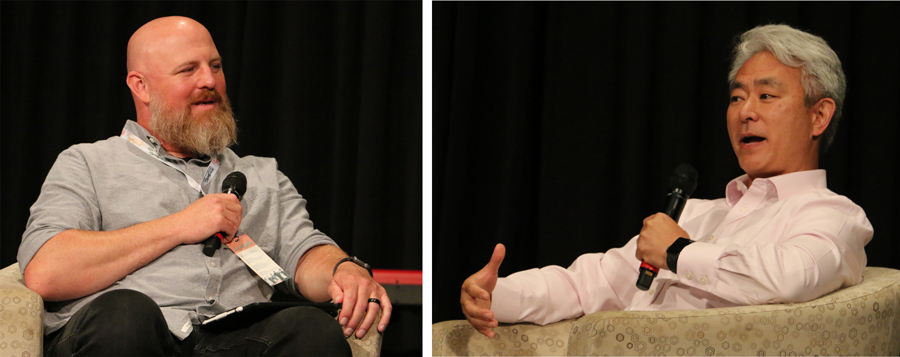
Brian Biedenbach, the new Communications director (left) interviewing Walter Kim on Wednesday afternoon.
Winsome and Wise
On Wednesday afternoon, as part of the business session, incoming Communications director Brian Biedenbach did a conversational interview with Dr. Walter Kim, the conference’s keynote speaker.
Dr. Kim, the president of the National Association of Evangelicals, addressed the NAE’s “winsome and wise” approach to public engagement, among other things.
Overall, things moved along faster than expected, and the meeting adjourned around 3:00 in the afternoon, an hour earlier than scheduled. Nobody minded that.
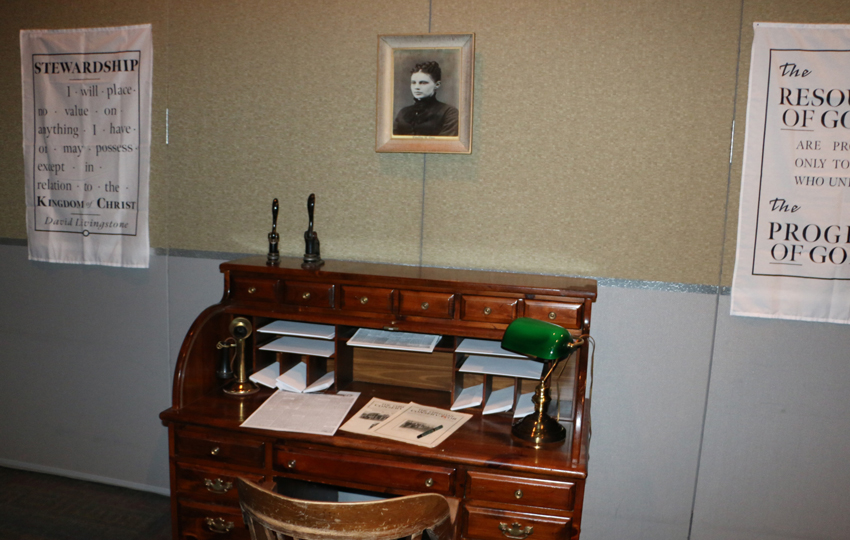
The 1800s recreation of the UB Missions office.
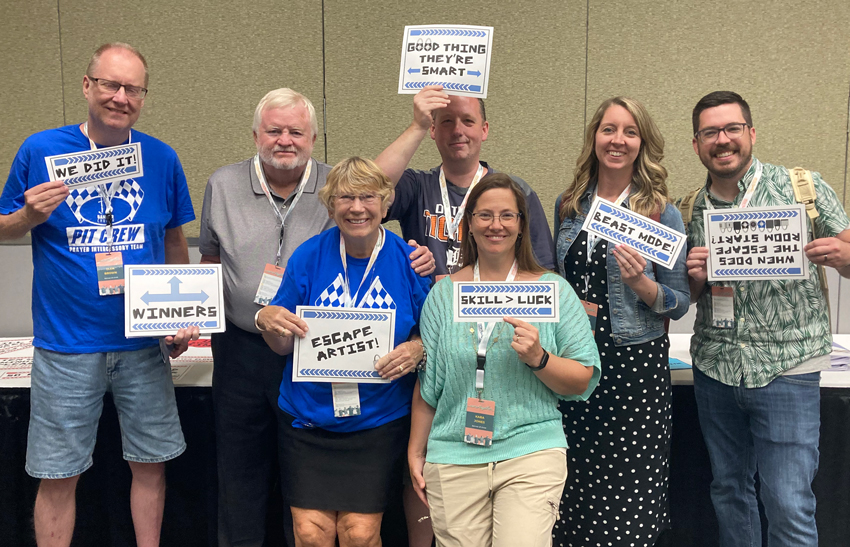
UB Global Escape Room
UB Global’s Escape Room was a big hit at the 2021 National Conference, so they did it again. This time, they recreated two versions of the UB mission office—from the 1800s, and from the present. The Escape Room kept busy throughout the conference.
Ordination of Seven Persons
On July 14, six men and one woman were ordained during the closing service on Friday morning. This is always a highlight of National Conference. It’s inspiring to see men and women ordained as United Brethren ministers—“elders,” we call them.
Ordination is the culmination of years of education, examination, and faithful ministry experience. Some persons choose to be ordained in their local church, among the people who know them best. Others wait to be ordained at National Conference—six in 2011, four in 2013, six in 2015, nine in 2017 (our 250th anniversary conference), four in 2019, and one in 2021 (our “post-Covid” conference).
Bishop Fetters conducted this year’s ordinations, as he has done since 2017. Candidates select two persons, usually other ordained UB ministers, who have had a meaningful role in their life. These two persons join the bishop in the “laying on of hands.” Scripture is read, prayer is offered, and timeless words are spoken—the same words heard by hundreds of men and women ordained throughout our history.
As the candidate (and spouse, if attending) kneel, the bishop and others lay hands on the person’s head, and the bishop says: “Take authority to execute the office of an elder in the Church of the United Brethren in Christ in the name of the Father, and of the Son, and of the Holy Spirit.”
The candidate then stands and is handed a Bible by the bishop, who says, “Take authority to preach the Word of God and to administer the ordinances in the Church of the United Brethren in Christ.”
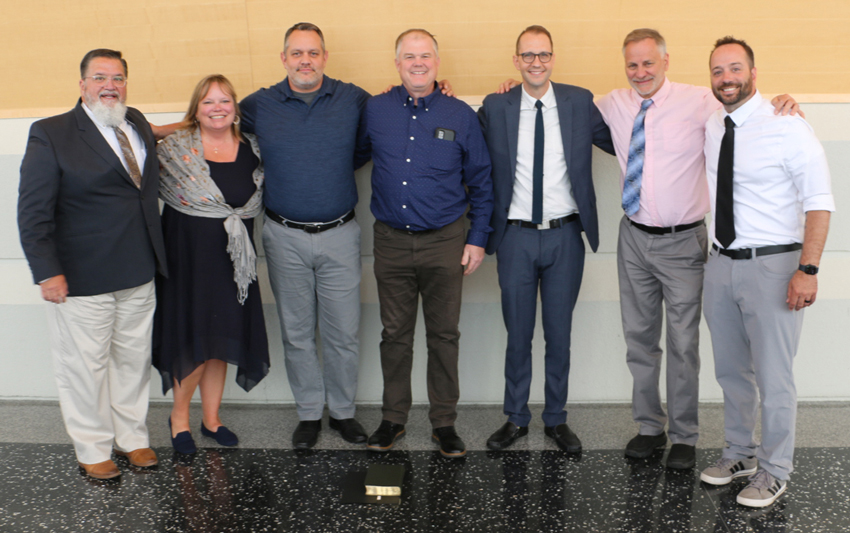
The seven persons ordained on July 14, 2023 (l-r): Brad North, Jennifer Smith, Jerald Jones, Rick Tawney, Sam Ward, Aaron deNeui, Eric Griffon.
The seven persons ordained on July 14 were:
- Brad North, senior pastor since 2018 of South Scipio UB church (Harlan, Ind.).
- Jerald Jones, senior pastor since 2018 of McCallum UB church (Delton, Mich.).
- Jennifer Smith, women’s pastor since 2016 at Emmanuel Community Church (Fort Wayne, Ind.).
- Aaron deNeui, senior pastor since 2018 of Philomath UB church (Philomath, Oregon).
- Sam Ward, worship pastor since 2000 at Emmanuel Community Church (Fort Wayne, Ind.).
- Rick Tawney, church planter and pastor of First UB church (Columbus, Ohio). He started Renew of Columbus in 2019, and in 2022 also became pastor of First UB.
- Eric Griffon, worship pastor since 2017 at Fowlerville UB church (Fowlerville, Mich.).
I love seeing the newly ordained ministers being sent out! May God be with them and grant them fruit in the harvest field.
Church Planting
Over the past two years, 2021-2023, the Lord has directed the United Brethren Church toward starting churches in Arizona and Pennsylvania. Both plants have taken root and are making an impact in their communities, which are very different.
Through our partnership with Stadia, National Ministries director Mike Dittman and Andy Sikora, associate director of Church Planting, linked up with Nate Sams to start Known Church in Surprise, Ariz. (not far from the Huntington University campus in Peoria).
Bishop Todd Fetters and Andy flew out to Arizona to meet with Nate in January 2022. Bishop Fetters recalls, “Nate took us around the area, and it was neat to see the Peoria/Surprise region through his eyes and heart. Nate and his team met every Sunday in March at an elementary school in Surprise. Then, on April 3, 2022, Known Church held its public launch at the school. They had 65 people for that first service, and are now seeing about 50 people each Sunday.”
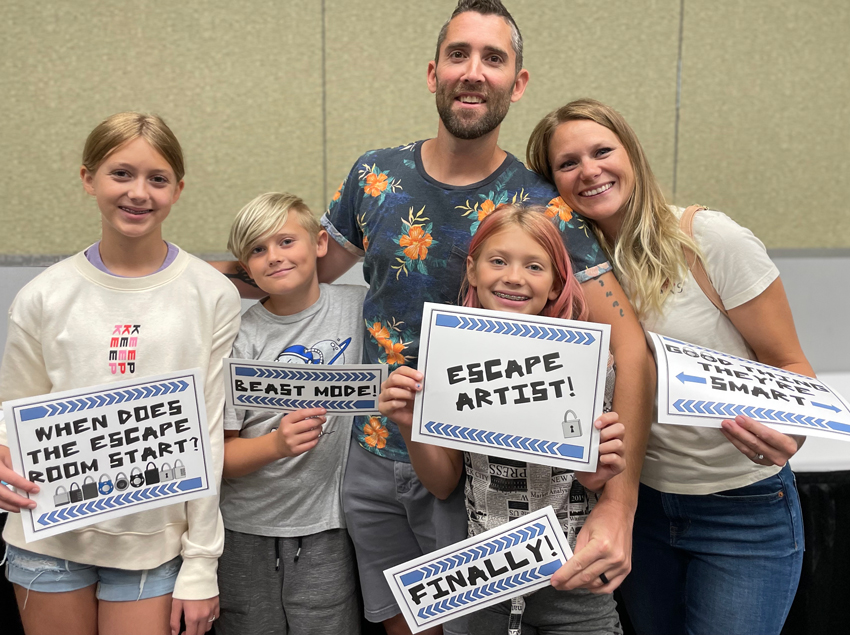
Among the first to go through the Escape Room was the family of Nate Sams, who is 18 months into planting a new UB church in Surprise, Ariz. Nate is also campus pastor at Huntington University’s campus in Peoria, Ariz.
Nate said the church is currently in transition. The school where they had been meeting lacks air-conditioning, which is not something you want to be without during summers in Arizona—and particularly not this summer, with unusually extreme heat. So they are looking for a new place, and waiting for God to provide.
We also have new churches underway in Brookville, Pa.; Columbus, Ohio; Commerce, Mich.; and Harrisburg, Pa. When it comes to methodology, Bishop Fetters says, “Our team has an ‘all of the above’ approach to church planting.”
Andy Sikora introduced the Sams family during the July 14 service which concluded the US National Conference. He led in a time of prayer for the Sams family and Known Church.
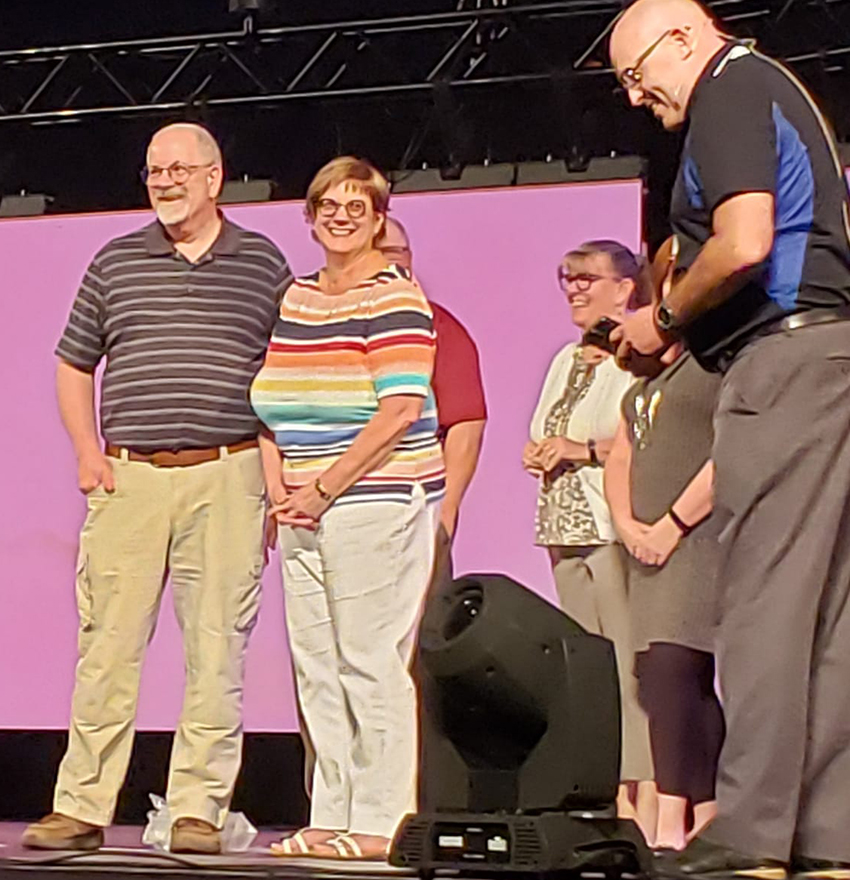
Steve and Pam Dennie (left) being recognized on Wednesday night by Bishop Todd Fetters.
Recognizing 45 Years of Service
On Wednesday night, after the evening service, Steve Dennie was recognized for his 45 years of service to the denomination, 1978-2023. He is retiring at the end of August 2023. Steve was a senior at Huntington University when he was hired as assistant editor at the UB National Office. He became editor of the United Brethren magazine in 1982, and in 1993 his role was centralized under the title Communications Director.
Bishop Fetters offered words of appreciation to Steve, and then presented two framed pictures which included the covers of ten books Steve has written.
Randy Neuman, associate director of library services and director of the United Brethren Historical Center at Huntington University, wrote an article about Steve’s tenure at the national office. You can read it here.
Watch the Four Main Services
Videos of the four main services from the 2023 US National Conference have been posted online. You can now view each entire service, or just the message part.
You’ll also find three other resources:
- The “In Memoriam” video about UB ministers and missionaries who passed away during the previous two years.
- A “Remember Your Baptism” video used during the opening service.
- A playlist of the songs used by the worship team throughout the conference.
My first NC was in 2017. Being new to the denomination, I only knew the people from my church. With every conference I have attended, I have felt more and more like a part of the team. This year felt like a family reunion.
I’m continually thankful for and blessed by the spirit of unity within our denomination. Over the past decade, we’ve dealt with some difficult issues but they have not divided us. I am thankful to be a part of a denomination that stands firm in what matters and stays united despite our non-essential differences. I’m excited to see what God has in store for the UBiC!
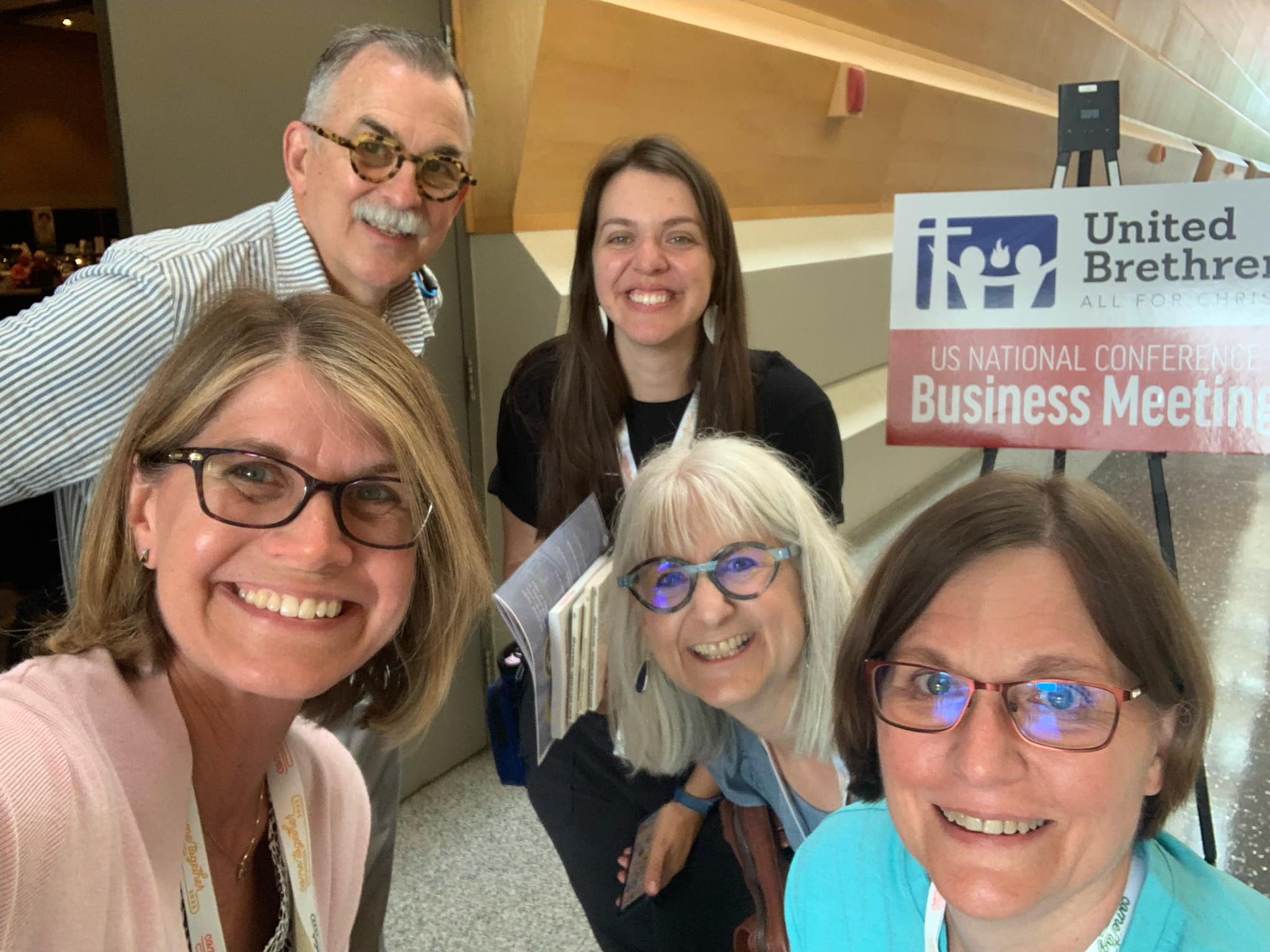
Former and current Macau missionaries. clockwise from upper left: Luke Fetters, Jenaya Bonner, Jennifer Blandin, Audrey Fetters, Stacey Gentry.
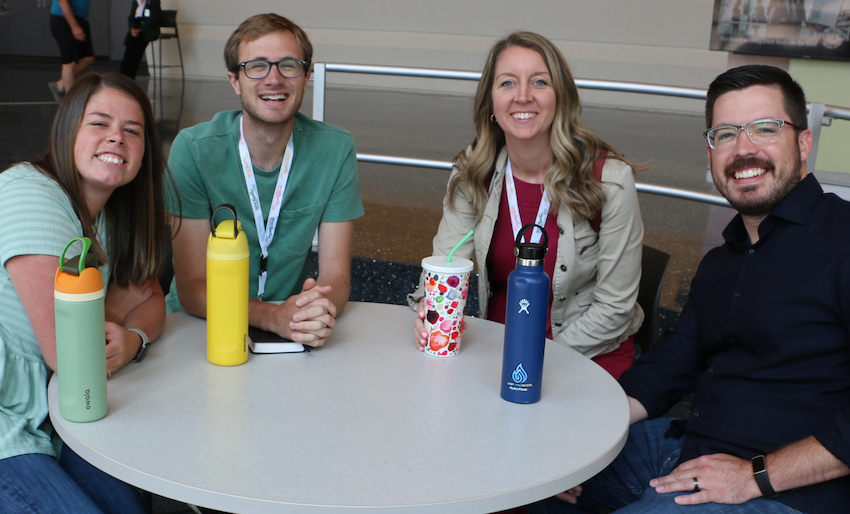
Left: Colin and Myra Raab, newly assigned to the UB church in Zanesville, Ind. Right: Byron Spear, senior pastor of Banner of Christ UB church (Byron Center, Mich.) and his wife, Alicia.
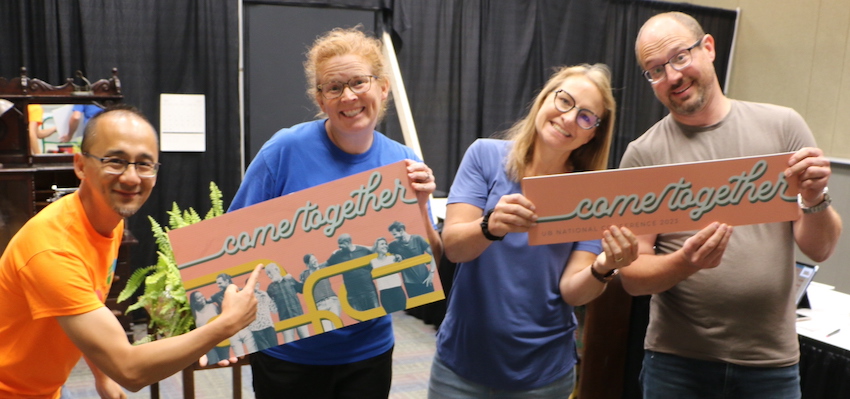
UB Global people in the escape room. L-r: Frank Yang, Melissa Kline, Courtney Waterman, David Kline.
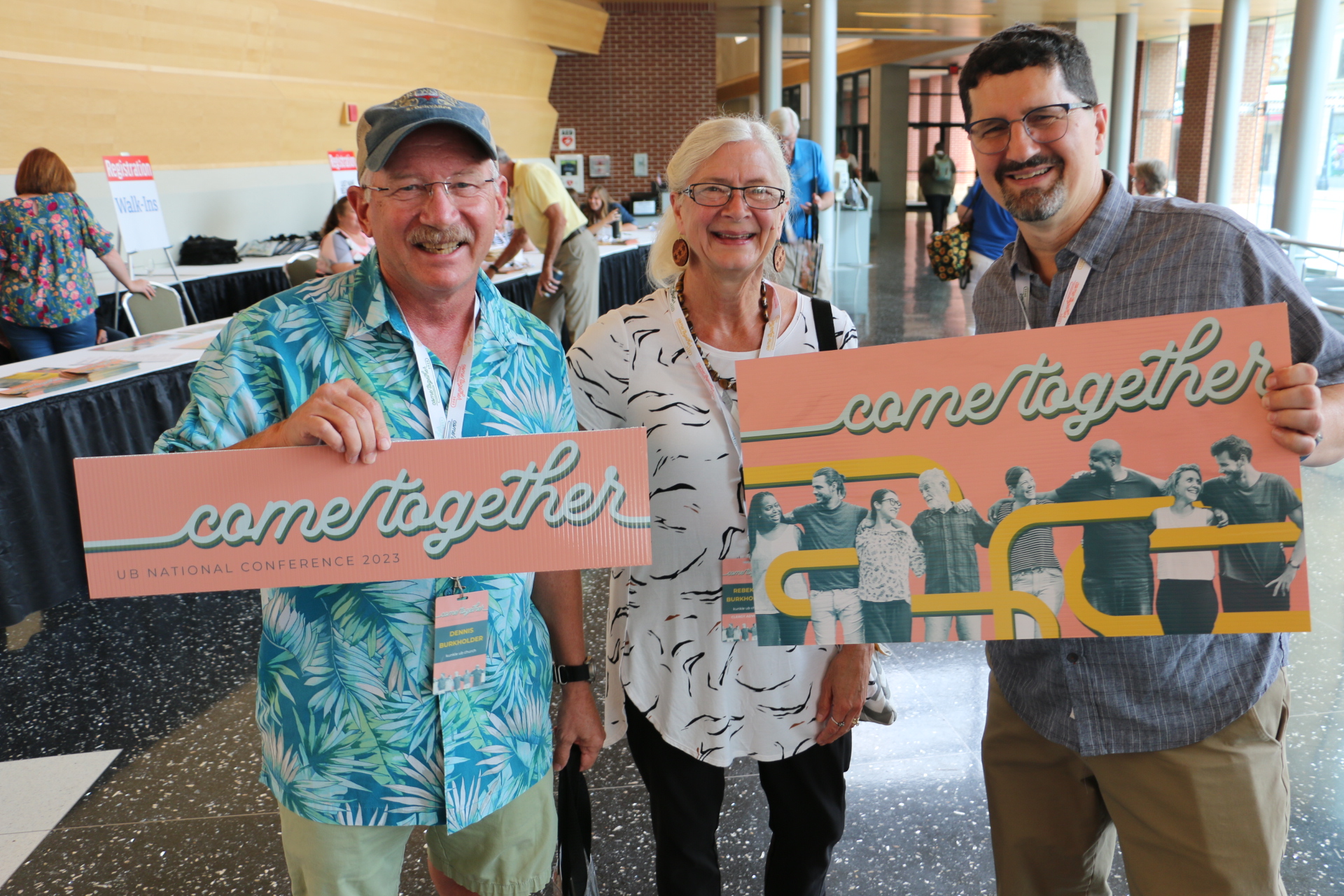
UB Global associate director Steve Fish (right) with former Sierra Leone missionaries Dennis and Becky Burkholder.
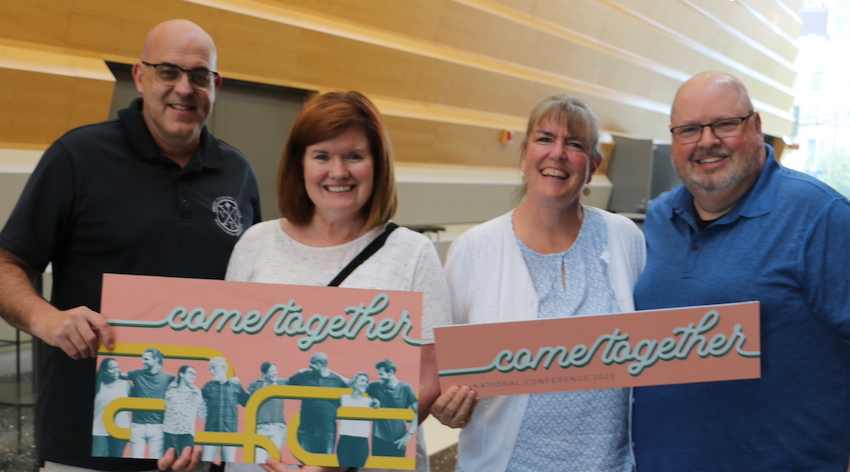
Bishop Todd and Lisa Fetters (left) with Jim and Janet Bolich, from Chambersburg, Pa.
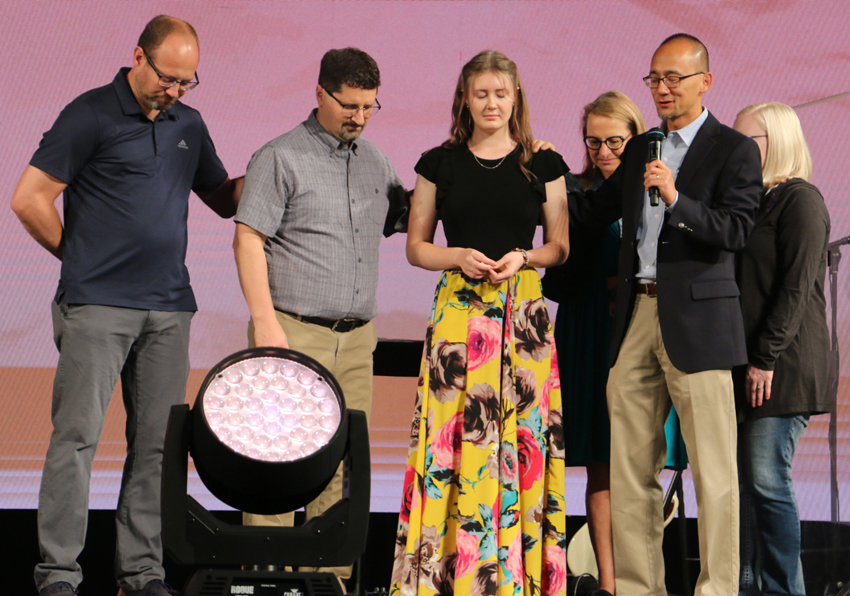
The UB Global staff led a commissioning service for Chloe Makely, who will begin a one-year term in Thailand in late 2023. During 2022, she served as an intern at our Good Soil Community Center in Thailand.

During the free time on Thursday afternoon, UB Global staff took interested people to various international establishments around Fort Wayne.
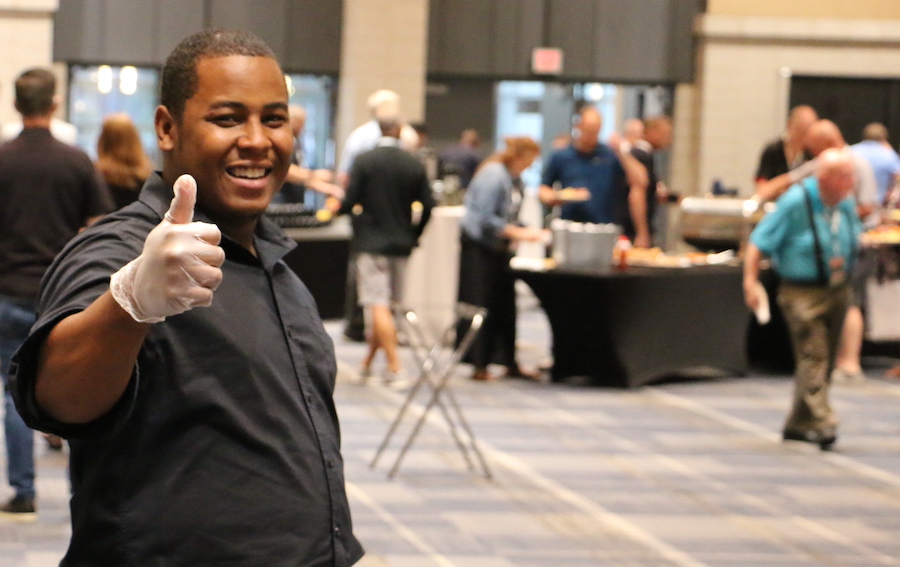
A thumbs-up from a member of the wait staff at the Grand Wayne Center.

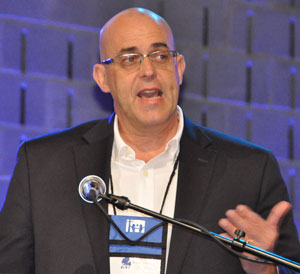
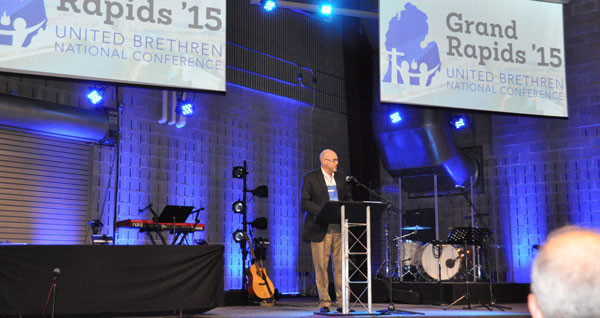
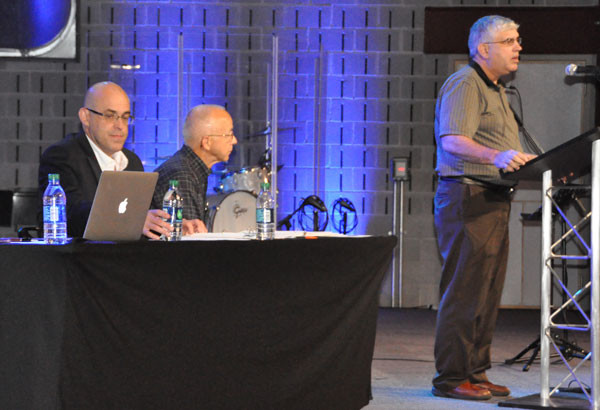
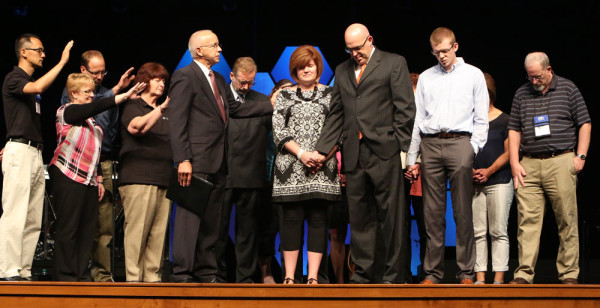
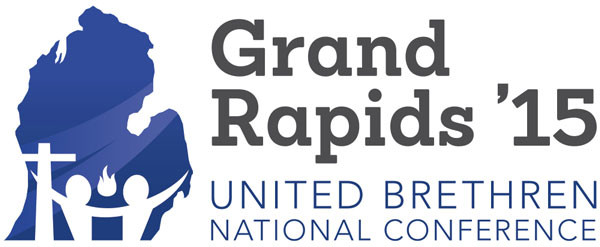
 Steve Dennie (right), Director of Communications
Steve Dennie (right), Director of Communications